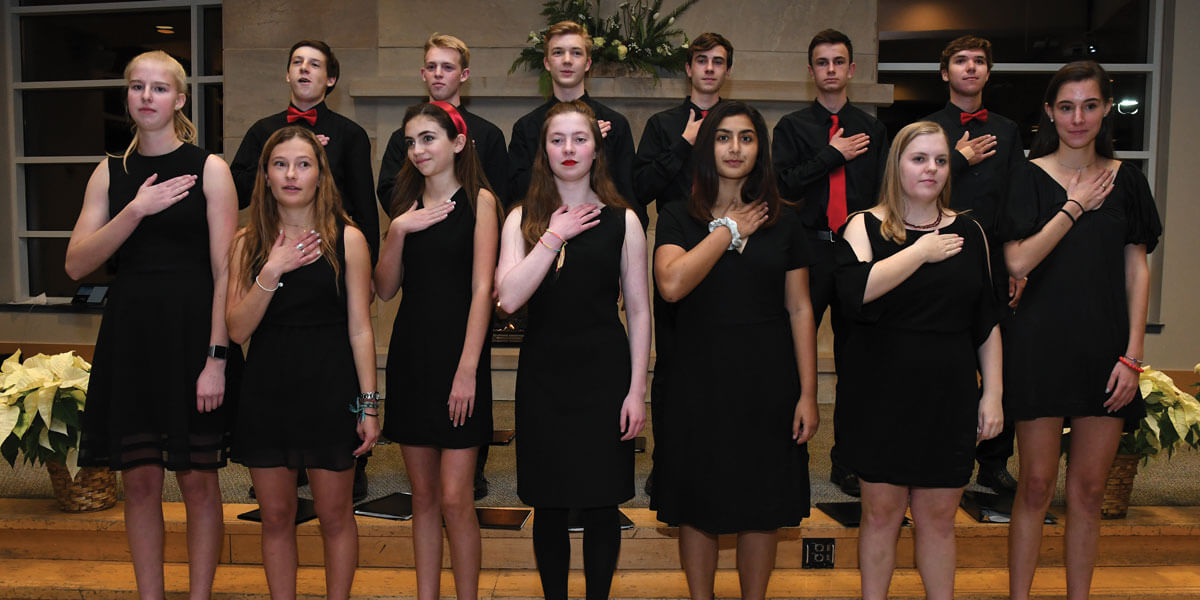At Colorado Academy, there are always three “A” disciplines in every student’s life—Academics, Athletics, and the Arts. While some might question the need for art as a required class for all students, CA never doubts the advantage of the arts—from the studio to the stage, from the dance floor to the choir room, from making a film to playing an instrument.
We talked to Director of Visual and Performing Arts Katy Hills, Director of College Counseling Sonia Arora, and to a variety of students to learn how being involved in the world of art carries over to academic work, other disciplines, daily lives, and even college aspirations. What is the advantage of the arts? Here, in their own words, are their answers.
“Instilling in our students the belief that they can create something out of nothing is of utmost importance. When they do so, they become designers, builders, creators, makers who can solve problems. In a world that changes daily—even minute-to-minute—students who have experience with art are flexible, adaptable, agile thinkers.”
Katy Hills, Director of Visual
and Performing Arts
“You are trying to make something that is aesthetically pleasing. It has to make sense and that has everything to do with mathematics. Art gives you the opportunity to unwind and take a time-out from stress in your life. And sometimes the results feel like they have more impact than an “A” in a class.”
Ella Freimuth, Junior, Studio Art
“Performing in front of people can make you feel vulnerable, but that is outweighed by the confidence you gain. Sometimes when I am working on Physics, I get stuck, and then I play the piano or sing, and it opens different pathways in my mind. You can’t be thinking about your Physics lab when you are playing Rachmaninoff!”
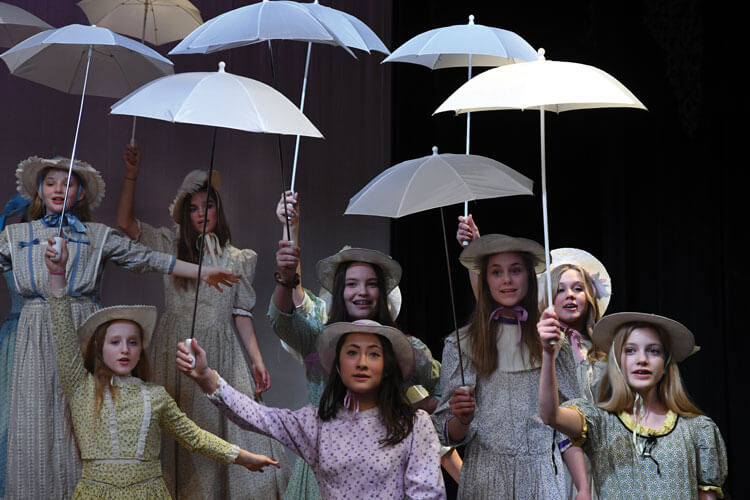
Colby Lish, Junior, Upper School Choir,
Piano, and Musical Theater
“It is no surprise to me that some of the most dynamic professionals in the world are also practicing artists. They have had practice engaging in what we call ‘artistic behaviors.’
- They have learned to persist and persevere, whether to complete a painting or learn a new piece on the violin.
- They have learned to stretch and explore. Even if they have never spoken in public, they try a role in a play, reaching beyond their comfort zone, thinking beyond what is obvious, and trying new solutions.
- They have learned to collaborate, whether with a dance troupe, with a choir, or with an orchestral ensemble. They learn how to hold up their end of the bargain and give constructive, honest, and respectful feedback. They understand that the more perspectives they bring to a problem, the better solution they will find.
- They learn to understand other people’s cultures, which broadens our perspectives. More diverse minds examining a problem produce a better solution.”
Katy Hills, Director of Visual
and Performing Arts
“Music Theory is very mathematical and has lots of ties to Physics and Math class. Practicing music creates a solid work ethic. Music connects people like nothing else. It’s made me a more social person. Actively trying to get better on my instrument translates into my life, where I am trying to better myself as a person.”
Jack Kuelling, Junior, Academy Jazz
“There is a deeper level of thinking that happens in the Ponzio Arts Center. Art helps you solve problems. You will be painting, and it’s just not working, but there is no answer sheet to tell you if you are doing something right or wrong. It’s up to you to find answers to the problems and challenges.”
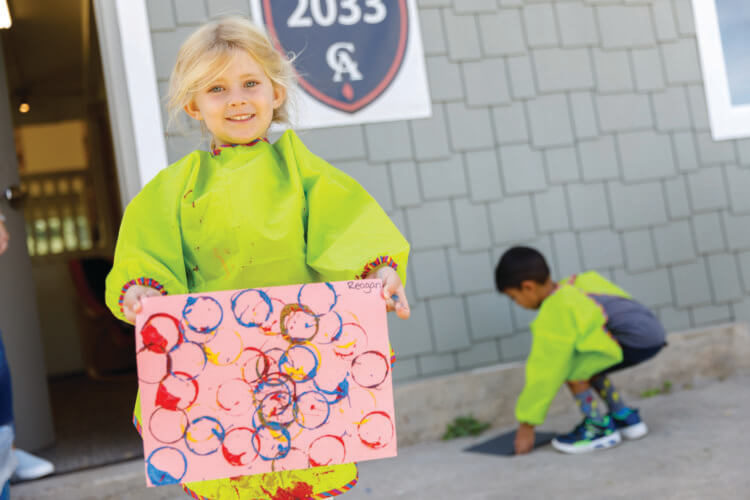
Britt Lochhead, Junior, Studio Art
“Colleges are looking for strong artists to enhance their communities. When students apply to college, they often are allowed to submit art supplements to show off their talents, whether in photography, painting, film, digital media, creative writing, music, or performing arts. CA’s Portfolio Program is perfect for this, because students put together a gallery show demonstrating their artistic vision.
“This kind of work shines through on a college application. It shows that you didn’t just do work to pass a test and get a grade. You had the passion to create something to pass your own grade.”
Sonia Arora, Director of College Counseling
“Art asks you to take chances. It also demands that you participate and become involved in the process. It teaches you to take the time to improve yourself. You learn you have to keep trying.”
Nate Kay ’20, Studio Art
“Music trains the brain. In our group, we hold each other accountable, just like people do in the real world. In order to play jazz well, you have to explore where it came from. Learning the cultural significance of jazz and recreating the feelings of people who played it at a certain time is like taking a deeper dive into history.”
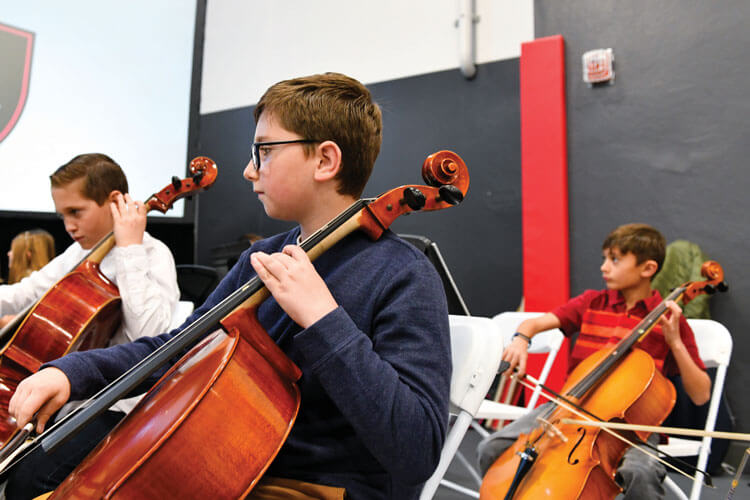
Chloe Brants, Junior, Academy Jazz
“Participating in art helps a student build a lifelong appreciation of the arts. Engaging in artistic behaviors helps develop a willingness to look at a complex problem and make multiple attempts to find a solution. In a tough Ceramics project, there may be multiple failures, but the artist persists until the successes outnumber the failures. That artist brings the same mindset to an AP Chemistry Lab.
“To have a successful career, we have to be dynamic problem solvers. Major companies—some of the most influential modern companies—are hiring people who demonstrate artistic behaviors, because they want people exploring ideas that others might think are impossible.”
Katy Hills, Director of Visual
and Performing Arts
“Studio Art is about the duality of freedom to create and discipline to complete something. You have to depend on yourself to solve problems. Basically, it’s a good way to learn to be a grown-up.”
Genevieve Howard ’20, Studio Art
“I took Video production courses for eight trimesters and it taught me organization. To make a video you have to be extraordinarily organized.”
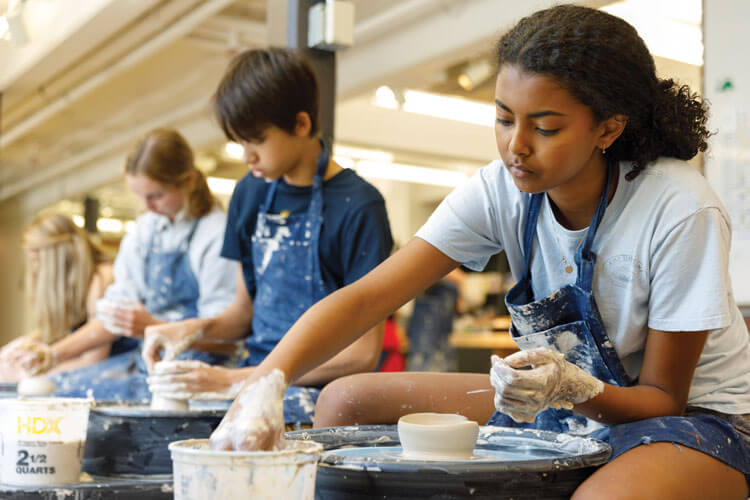
Brandon Cohen ’20, Digital Video
“Many selective and highly selective colleges and universities have built arts facilities, created relationships with arts in the local community, and hired arts faculty to draw students with interest in the arts to their campuses. There, they can become part of a vibrant creative community built around the arts—theater, choir, dance, studio arts—and that connection is so important, because it keeps students happy and engaged in college.”
Sonia Arora, Director of College Counseling
“Choir activates both sides of your brain. You are listening, singing, changing pitch, changing dynamics all at the same time, and that gets your whole brain firing. There are neurological advantages of that to other parts of your life. Singing makes you better at multi-tasking.”
Henry Chesley-Vogels, Junior,
Upper School Choir
“Performing in Choir has made me more comfortable with public speaking. Singing a solo is just like giving a speech, only with notes. Piano has taught me patience. The more advanced the piece, the harder I have to work. That teaches you that if there are tricky spots in any project, you will not get to an end product unless you spend the time and work at it.”
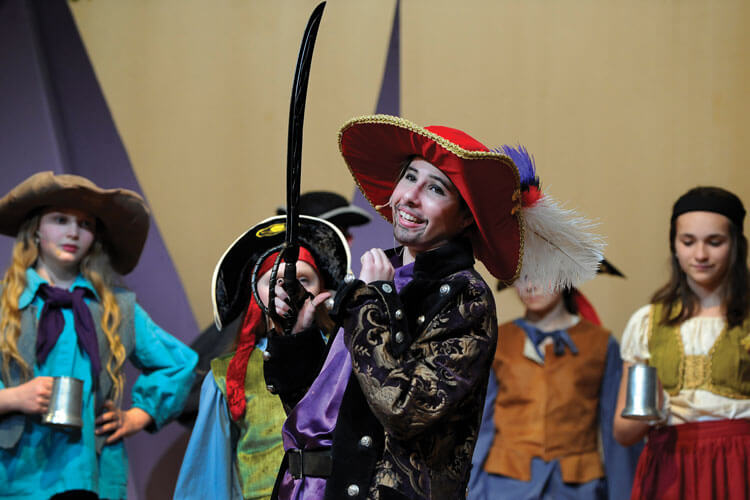
Jo Rydberg, Freshman, Upper School Choir, Piano
“When we become overscheduled with busy lives, one of the first things to go is practicing the creative process. It’s important for students to carve out time in their days to keep art in their life. It may be a challenge, but today, make time for art.”
Katy Hills, Director of Visual
and Performing Arts
“When you perform, you have to be true to yourself and grow as a person. You cannot do that if you don’t know who you are. And if you know who you
are, you will succeed.”
Colby Lish, Junior, Upper School Choir, Piano, and Musical Theater
